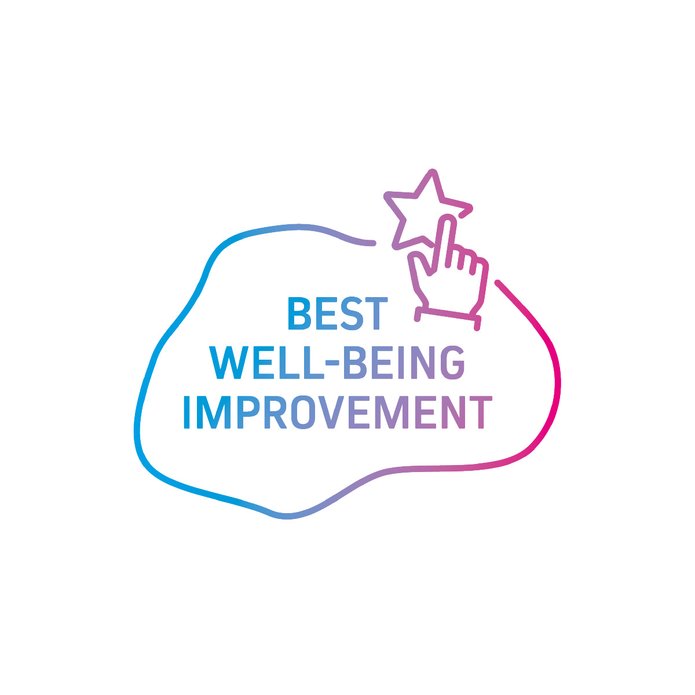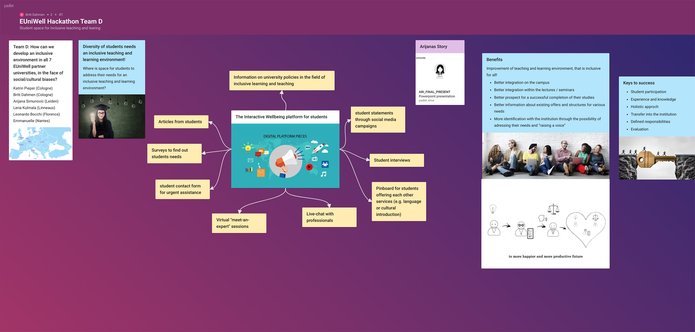
Hacking for Well-Being
For co-creating and developing our new European University for Well-Being, we face the challenge of integrating a large body of students, researchers, educators and staff from seven countries under a common ‘roof’, now having to rely mostly on digital and blended means and formats to start with. Further, climate crisis and the current pandemic have shown us that we have to develop new ways of thinking and acting in order to support and promote well-being on individual, societal, and global scales.
Our first EUniWell hackathon in the series “Hacking for Well-Being” had the topic
Our Future is Changing Its Direction: Well-Being Dimensions in a European University
and took place as a digital event between 14th to 21st September 2020 as a mix of two online events with moderated group work and a week of self-organized co-working within the groups in between.
On 21st September 2020 the four working groups presented their pitch solutions to these challenges. Afterwards the participants voted for their favourite pitches in the categories “Most Innovative”, “Most Applicable”, “Best Presentation” and “Best Well-Being Improvement”. One pitch that was submitted additionally received the “Special Award for Creativity”.
A big thank you to all participants in our hackathon for their wonderful pitch solutions, which will feed into what we will build and achieve together!
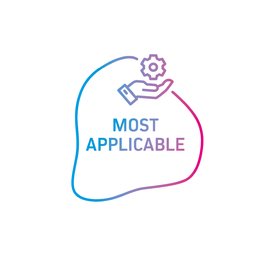
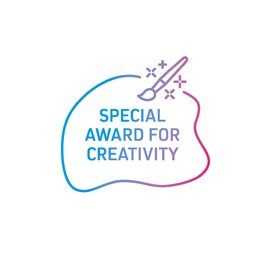
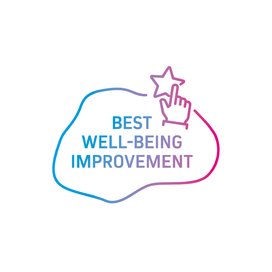
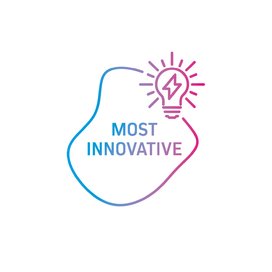
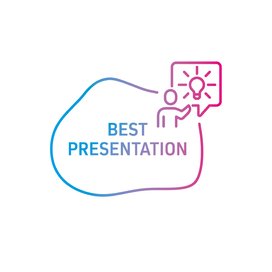
1. #EUniWell Community
Challenge: Which measures can we take to develop a joint EUniWell identity, despite being a consortium of 7 regionally distant and culturally diverse universities, where membership isn’t governed by location?
Main pitch by the working group
Citizens are core stakeholders of a modern, integrated, as well as locally and internationally connected university. Putting a specific emphasis on local communities and their places can be a unique asset and particular strength of already well-connected EUniWell partners.
The goal should be to design and implement a governance structure which facilitates the integration process of EUniWell as a perceived, living, and diverse body of knowledge creation. The process should aim to identify strengths in the EUniWell community and focus on topics which all universities have specific expertise in.
Therefore, moderators for the process at all member universities (representing researchers, teachers, student initiatives and existing formats of co-creation) should be found, who serve to identify key players, specific expertise and strengths of each university with regard to the EUniWell arenas of well-being, and who facilitate integration with the mutual development goals of the consortium.
A first overarching ‘kick-off’ project should be designed to provide a “living example” of what EUniWell stands for, and which should be of high public interest and tangibility, as well as closely tied to improving the well-being of local communities. This will not only create a ground for further projects, but also significantly enhance visibility of EUniWell. One idea could be to build a unique physical habitat in each of our 7 universities which would serve as a visible co-working space where EUniWell students, teachers, researchers, NGOs, local communities, local companies etc. can socially interact through co-created projects based on the socio-political and scientific issues that EUniWell prioritizes as related to EU SDGs.
The MEETOCHONDRION presented by M. Kalaridi, student at Linnaeus University
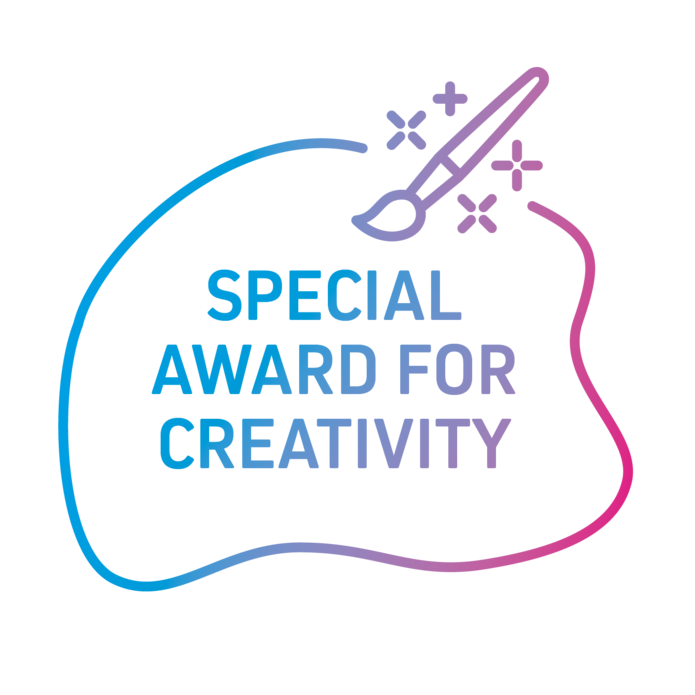
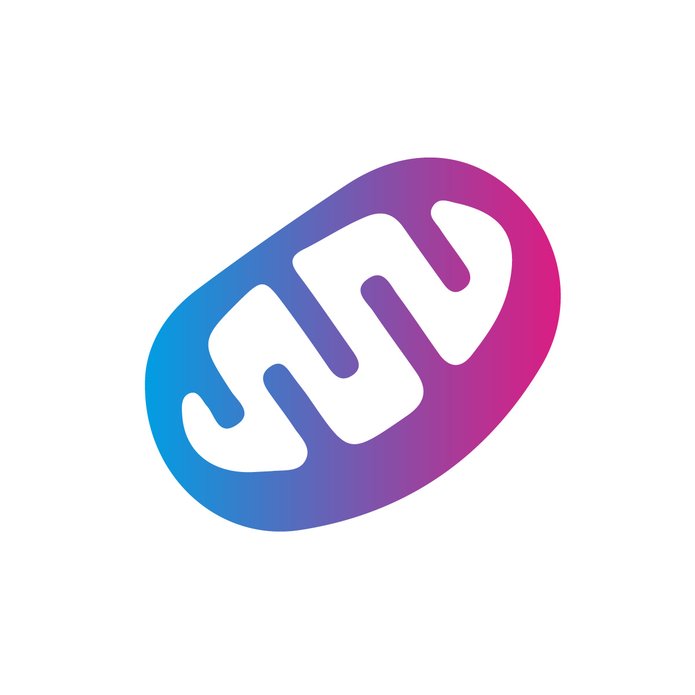
Being part of the team #EUniWell Community, one of the challenges we had to provide solutions for was the creation of a flexible environment, where university and external communities can work together. As a result, I came up with the idea of a “Meetochondrion”, a building whose outer appearance is identical to the one found in eukaryotic cells. “Meetochondrion” could serve as EUniWell’s physical co-habitat and co-working space in a location in Central Europe, where EUniWell students, NGOs and local communities interact either through rhetoric games or co-creating art based on the socio-political and scientific issues that EUniWell prioritizes and then co-organizing art exhibitions open to public. Its contribution would be significant not only to the promotion of democratic dialogue and exchange of knowledge among different actors, but also to the maintenance of students’ mental well-being, given that their studies in a digital environment could have serious implications on various aspects of their health.
2. #Inclusion vs. Bias
Challenge: As a European University, we are committed to European values, but we also want to show our cultural wealth and diversity and prevent falling to our cultural biases. How can we develop an inclusive environment in all 7 EUniWell partner universities, in the face of cultural biases?
The solution: The Interactive Well-Being Platform for students
The Diversity of Teaching needs an inclusive teaching and learning environment. This idea comprises an interactive well-being platform for students. This digital platform consists of a wide range of forums and services, ranging from a student contact form for urgent assistance with respect to inclusion or discrimination, which might lead to a live-chat with professionals, to surveys to find out about the students’ needs, as well as the exchange of information and opinions about inclusive teaching and learning policies in the partner universities. Based on the policies of the 7 EUniWell Universities on inclusive teaching and learning students’ opinions and experiences will be collected via interviews, articles, social-media-statements, live-chats, virtual “meet-an-expert”-happenings as well as questionnaires. These are transferred into the institution via discussion events with teachers and university leaders, so that cultural change and adaptions can be initiated
This approach needs a definition of responsibilities in monitoring and preventing misusage of the platform. Another key for the implementation is the commitment and responsibility of each university to contribute to this platform in order to make it successful.
3. #Digital Teaching
Challenge: Teaching and learning will be conducted by hybrid/blended teaching concepts to enable access to courses from all of our 7 partner universities. What could a Masters’ programme look like with a mixture of digital/offsite and physical/onsite classes?
The pitch: EUniWell – An Interview from the Future
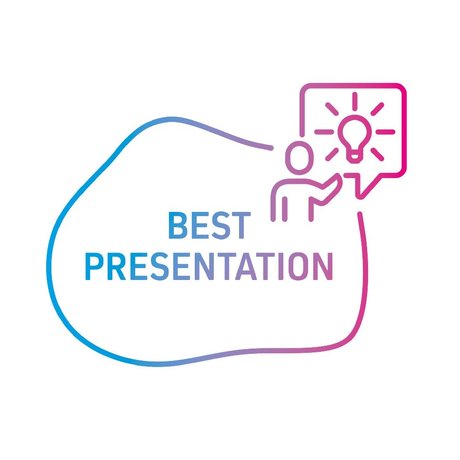
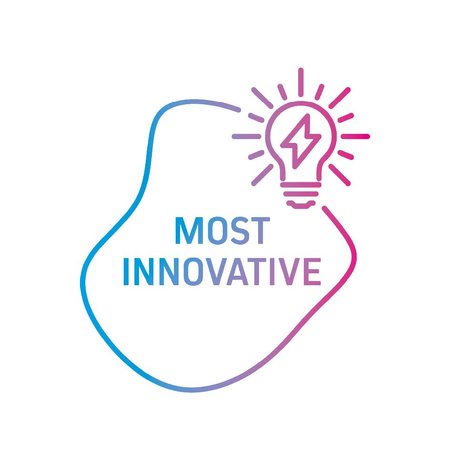
Team #Digital Teaching presented a video showing an interview with two hypothetical future EUniWell students, who are interviewed about their respective Master programs in the year 2023. The interview shows the opportunities of the EUniWell Alliance. Annoek is studying in the EUniWell Master programme on the Economy of Well-Being. Joint master programmes are central to the success of the consortium. In order to make it possible to commit and contribute to the programme for all seven universities, digital teaching is a necessity.
Even though physical exchange is also strong component of EUniWell, even in a Master programme located at several campuses it will be hard to include all seven universities with a physical semester abroad. For Annoek, the EUniWell Master makes it possible to take courses at several universities while being physically located at one of them.
Angus is finishing his Master studies in Contemporary European History and for his Master thesis he is using the EUniWell network to realize research in several digital archives. Also, he has two external supervisors for this thesis from the Alliance.
The joint master programmes are a central element of EUniWell, in which the seven partner universities combine their strengths and add a special element to their joint curricula. The digitalisation of course programmes makes it possible to attend courses at all seven partner universities.
Even if you are studying mainly in one of the EUniWell universities you may still profit from the EUniWell network. Angus’s master thesis is a good example for this. While he is mainly studying at the University of Birmingham, he has two external supervisors from EUniWell partner universities, and he is using the infrastructure network of the alliance to do research in different digital archives.
In addition to full joint study programs, the future integrated EUniWell Campus also offers the possibility for students to sign up for single lectures and seminars provided digitally by another EUniWell partner. These course offers, often co-taught by two lecturers, are fully recognized and integrated within local study programs.
This impressive high degree of curricular integration was made possible by a joint effort of all EUniWell partners in defining joint goals and standards, combining their strengths and assigning network-wide responsibilities in the field of digital education.
4. #Students’ Centre Stage
Challenge: Students’ interests are at the core of our EUniWell alliance. What could be ways and means to facilitate and spread student participation and commitment throughout the alliance?
The solution: student ambassadors and a EUniWell alumnus network
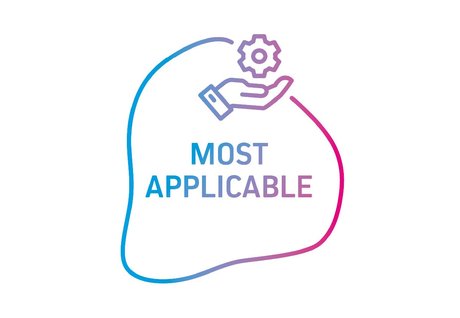
In order to integrate students not only in their local university but also into the EUniWell consortium it is important to catch the attention especially of new students but also of those who are already further advanced in their studies through clear and recognizable branding as well as student and teacher ambassadors.
Apart from including EUniWell in the local student orientation days at the start of every semester, team #Students’ Centre Stage proposes to recognize engagement within the seven partner universities by providing different kinds of incentives to boost the willingness of students to volunteer for EUniWell programmes. Further, linking local student engagement for example with a prioritization for exchanges within EUniWell is an idea to keep students attached to the alliance and makes the consortium even more attractive.
Additionally, team #Students’ Centre Stage suggests to connect the partner universities by organizing joint events such as symposiums in which young researchers have the opportunity to present their work, linked sports competitions and various recreational offers.
Next to the local volunteering the idea of an own EUniWell alumnus network is to keep people interested in the consortium and support future generations of EUniWell students in their future careers. for contacts and international networks.
Voices from the event:
“Future vision of what we want our universities to look like is key.”
(Prof. Dr. John Goddard, University of Birmingham)
“I think it’s crucial that we come up with a structure for how to develop what students and researchers need, and how we can make the EUniWell experience a worthwhile and unique one.”
(Dr. Björn Schmitz-Luhn, University of Cologne)
“We need to keep in mind sustainability, inclusiveness, openness. It is very important to clearly communicate our common values so that it gets easy to identify with them.”
(Elena Vinci, Linnaeus University)
“Great Experience working on digital teaching!”
(Claude Manuela Ngatchou, University of Cologne)
“[I]t is not only important to connect exchange students but also to connect them with the EUniWell students from that country to share about the country they are studying in.”
(Annoek Reitsema, Leiden University)
